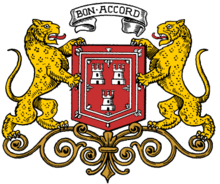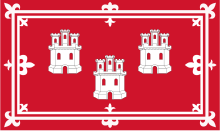Etymology of Aberdeen
| Look up Aber or aber in Wiktionary, the free dictionary. |
The Etymology of Aberdeen (which is the meaning / origin of the word) is that of the name first used for the city of Aberdeen, Scotland. It is the original, which then gave its name to other Aberdeens around the world as Aberdonians left Scotland to settle in the New World and other colonies.
Aberdeen is pronounced ![]() i/æbərˈdiːn/ in Received Pronunciation, and [abərˈdin] (with a short a sound) in Scottish Standard English. The local Doric pronunciation, [ebərˈdin] (with a long a sound), is frequently rendered "Aiberdein".
i/æbərˈdiːn/ in Received Pronunciation, and [abərˈdin] (with a short a sound) in Scottish Standard English. The local Doric pronunciation, [ebərˈdin] (with a long a sound), is frequently rendered "Aiberdein".
Aberdeen
The area we know as Old Aberdeen today is the approximate location of the first and original Scottish settlement of Aberdeen. Originally the name was Aberdon which literally means "at the mouth of the Don", as it is situated by the mouth of the river Don.
"Aber-" prefix
In reference to Aberdeen, "Aber-" is pronounced locally as [ebər].
Meaning
The prefix; "Aber-" means the "confluence of waters", "river mouth" or
the "embouchure" of a river where it falls into a larger river or the sea. It can also be used as a metaphor for a harbour.[1]
"Aber-" is used as a prefix in many placenames in Scotland and more often Wales.
Origin
"Aber-" is a common Brythonic element, meaning a "confluence". It is presumably that the Pictish language was at least partly P-Celtic as evidenced by various names. Other examples of this prefix in Scotland are Aberfeldy, Aberdour, and "Aberbrothick" (an old form of "Arbroath"). In Wales, there are frequent examples such as Aberystwyth and Abertawe (the Welsh for "Swansea") are examples. Other Brythonic examples include Falmouth (which is known as "Aberfal" in Cornish), and Aber Wrac'h near Plouguerneau in Brittany
Locations
"Aber-" can be found all over Scotland, predominantly on the east-coast. The alternate spelling of "Abhir-" may also often used.
As well as the east-coast of Scotland, places with the prefix "Aber-" or a variant are found all over Wales and the west coast of England and in Brittany. However they are not found on the east-coast of England or in Ireland.
"-deen" end element
The second element is more contentious. It probably refers to "Devona", which is a name of one or both of the Rivers Don and Dee, which may also have Brythonic etymologies (note also the River Dee, Wales).
Scottish Gaelic
Although Scottish Gaelic has not recently been a primary language on the north east coast, it was spoken in the region (cf Book of Deer) in centuries past, as is attested to by Goidelic placenames in the region such as Inverurie, Banchory, Kincorth and Balgownie.
The equivalent of "Aber-" in Goidelic is Inbhir, which is usually anglicised as "Inver-". However, the name is rendered into Scottish Gaelic slightly differently.
Two variant spellings of Aberdeen are;
- Obaireadhain
- Obar Dheathain
These are pronounced [ɔbəren] or [ɔbərjehɪn].
Roman (Latin)
In Latin, the Romans referred to Aberdeen with various Canonical names;
- Aberdonia[2]
- Aberdona[2]
- Verniconam[2]
- Aberdonum[3]
- Aberdonium[3]
- Abredonia[3]
- Devanha (a name references in modern times by the street, Devanha Gardens, and the now closed Devanha Distillery and Devanha Brewery)
Celtic times
Ptolemy wrote in 146 AD that in Celtic times Devana (the Roman name at the time) was the capital of the ancient tribal area Taexali- however although Devana is attributed to Aberdeen there is a possibility the capital could have been Barmekyne Hill in Banffshire.
River names
They referred to the settlement in approximation to its location at the sea mouths of local burns and rivers, using the names;
- Devana - for the Denburn (a stream/burn running through the city) and which featured in Ptolemy's "System Of Geography" of 146 AD[4]
- Deva - for the river Dee (and also the Roman name for other "river Dee"s in Scotland and Wales but also the name of the Deva River, Spain)[4]
- Devona - for the river Don (and also the name for a Celtic river goddess)[4]
Nicknames
Aberdeen also has a number of nicknames, and poetic names -
- "The Granite City" [5][6] - the most well-known, due to the copious use of local grey granite in the city's older buildings.
- "Furryboots City" [7] - This is a humorous rendering of the Doric, "far aboots?" ("Whereabouts?"), as in "Far aboots ye fae?" ("Whereabouts are you from?")
- "The Silver City by the Golden Sands"[5] or often simply just the "Silver City". Less flatteringly, also "the Grey City". This again is partly due to the granite.
- "Oil Capital of Europe" [8][9] - There are numerous variants on this, such as "Oil Capital of Scotland" etc.
- "Energy Capital of Europe" - the "politically correct" name now being used in the city as it tries to project a "greener" image, not based on oil.[8]
Academic variations
Kennedy
William Kennedy proposes the spelling variations:[10]
- Aberdaen
- Aberdin
- Aberdene
- Abrydene
Orkneyinga saga & Old Norse
The Orkneyinga saga records an Old Norse variant of the name, "Apardion",[11] clearly cognate with the modern form.
Unlikely sources
There have been more eccentric etymologies, e.g. "Boxhorn considered it Phoenician in origin."[1]
This is unlikely, however, as no Phoenician sites have been found this far north.
Residents
Residents or natives of Aberdeen are known as "Aberdonians", whence Aberdeen F.C.'s nickname, "the Dons".
References
- 1 2 Richard Stephen Charnock (1859). Local Etymology: A Derivative Dictionary of Geographical Names. Houlston and Wright.
- 1 2 3 Hofmann, Johann Jacob (1635-1706): Lexicon Universale
- 1 2 3 Grässe, J. G. Th., Orbis latinus; oder, Verzeichnis der wichtigsten lateinischen Orts- und Ländernamen, 1861, 2nd ed. Berlin: Schmidt, 1909, OCLC 1301238, online at Columbia University; a standard reference to Latin placenames, with their German equivalents (re-edited and expanded in 1972).
- 1 2 3 "Aberdeen Civic Society: Round and About 1". Retrieved 2007-05-20.
- 1 2 "The Granite City". Retrieved 2007-05-20.
- ↑ "Granite City Wanderers Hockey Club". Archived from the original on 2007-04-05. Retrieved 2007-05-20.
- ↑ "BBC Have Your Say: Regional accents: Your experiences". BBC News. 2005-08-16. Retrieved 2007-05-20.
- 1 2 Arnold, James (2003-11-12). "A burst of energy in Europe's oil capital". BBC News. Retrieved 2007-05-20.
- ↑ "OIL & GAS SITUATION REPORT : UKCS and North East Scotland (Mid 1999)". Retrieved 2007-05-20.
- ↑ William Kennedy (1818). The Annals of Aberdeen.
- ↑ Anderson, Joseph (Ed.) (1893) Orkneyinga Saga. Translated by Jón A. Hjaltalin & Gilbert Goudie. Edinburgh. James Thin and Mercat Press (1990 reprint). ISBN 0-901824-25-9


